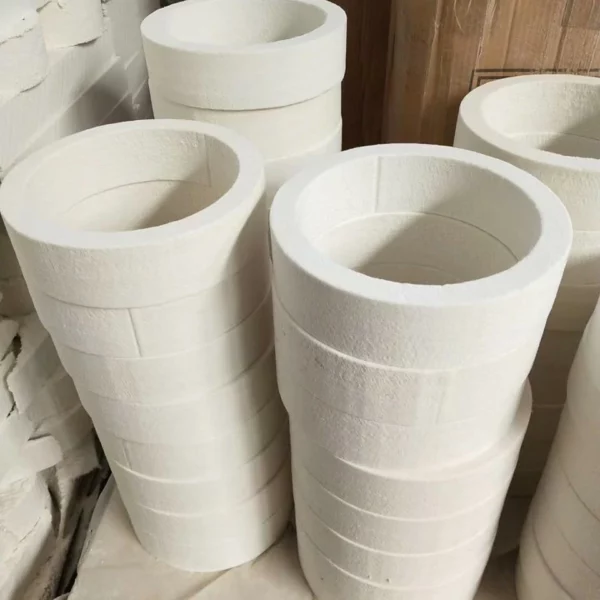1260C ceramic fiber vacuum formed products find applications in various industries that require high-temperature insulation and thermal management.
Here are some industries commonly known to utilize these products:
Petrochemical and Refining: The petrochemical and refining industry often employs 1260C ceramic fiber vacuum formed products for insulation in furnaces, heaters, boilers, and other high-temperature equipment.
Power Generation: Power plants, including those using fossil fuels or renewable energy sources, utilize 1260C ceramic fiber vacuum formed products in applications such as insulation for boilers, ducts, and exhaust systems.
Steel and Metal Processing: Industries involved in steel manufacturing, metal processing, and casting utilize these products to provide insulation in furnaces, ladles, crucibles, and other thermal containment systems.
Glass Manufacturing: The glass industry relies on 1260C ceramic fiber vacuum formed products for insulation in glass melting furnaces, glass forming machines, and other high-temperature processes.
Ceramic and Pottery: Ceramic and pottery production facilities utilize these products for insulation in kilns, drying ovens, and other heat treatment equipment.
Automotive and Aerospace: The automotive and aerospace industries may use 1260C ceramic fiber vacuum formed products for insulation in exhaust systems, engine compartments, and other high-temperature areas.
Foundries: Foundries that produce metal castings utilize these products for insulation in molds, ladles, and other equipment involved in the casting process.
Incineration and Waste Management: Facilities involved in waste management, incineration, and hazardous waste treatment may utilize these products for insulation in incinerators and high-temperature waste treatment equipment.
Chemical Processing: Chemical plants often require insulation in reactors, distillation columns, and other high-temperature vessels, where 1260C ceramic fiber vacuum formed products can be utilized.
Research and Development: Laboratories and research facilities that conduct high-temperature experiments or develop thermal management solutions may use these products for insulation and heat containment.
These are just a few examples, and 1260C ceramic fiber vacuum formed products have applications in many other industries where heat insulation is crucial. The specific usage may vary depending on the requirements and operating conditions of each industry.
What are the advantages of using 1260C ceramic fiber vacuum formed products?
Using 1260C ceramic fiber vacuum formed products offers several advantages in high-temperature insulation applications. Here are some key benefits:
Excellent Thermal Insulation: These products have low thermal conductivity, meaning they effectively reduce heat transfer and provide efficient insulation. They can withstand high temperatures up to 1260 degrees Celsius (2300 degrees Fahrenheit), making them suitable for demanding thermal environments.
Lightweight: 1260C ceramic fiber vacuum formed products are lightweight, which makes them easier to handle, install, and transport compared to traditional refractory materials. This characteristic also reduces the load on supporting structures.
Low Heat Storage: Ceramic fiber materials have low heat storage capacity, allowing for quick heat-up and cool-down cycles. 1260C ceramic fiber vacuum formed This property contributes to energy savings and improved process efficiency.
Thermal Shock Resistance: These products exhibit good resistance to thermal shocks, enabling them to withstand rapid temperature changes without cracking or spalling. This makes them suitable for applications involving cyclic heating and cooling.
Chemical Stability: 1260C ceramic fiber vacuum formed products have excellent chemical stability, meaning they are resistant to most corrosive agents. This property ensures their longevity and performance in harsh environments.
Flexibility and Conformability: These products can be easily shaped and formed to fit complex geometries and contours. They can be customized to suit specific equipment or insulation requirements, providing a seamless and efficient insulation solution.
Reduced Heat Loss: By minimizing heat transfer through insulation, 1260C ceramic fiber vacuum formed products help reduce heat loss from industrial equipment. This leads to energy savings, improved thermal efficiency, and reduced operating costs.
Fire Resistance: Ceramic fiber materials have inherent fire resistance properties, making them suitable for applications where fire safety is crucial. They do not contribute significantly to flame spread or smoke generation.
Durability and Longevity: 1260C ceramic fiber vacuum formed products are designed to be highly durable, with good resistance to mechanical stress, abrasion, and thermal cycling. They have a long service life, reducing the frequency of replacement or maintenance.
Versatile Applications: These products find applications in a wide range of industries, including petrochemical, power generation, metal processing, glass manufacturing, automotive, and more. They are suitable for various high-temperature insulation needs, such as furnaces, kilns, boilers, ducts, and other thermal containment systems.
It’s important to note that while 1260C ceramic fiber vacuum formed products offer numerous advantages, proper installation, handling, and adherence to safety guidelines are essential to ensure their optimal performance and longevity.

